The Brighton Road - Belated thanks for WW's account of Stevin's [Simon Stevin] investigations about the composition and resolution of forces. JH finds what WW says of Stevin agreeable to what Lagrange says. JH has not been employed in experiments on polarization for some months, and instead has been 'familiarizing myself with the known phenomena, and acquiring that practical habit of experimentation without which it is useless to attempt anything new'. [David] Brewster's discovery of more than one polarising axis in various crystals is a most important discovery, and completely upsets [Jean Baptiste] Biot's division of doubly refracting crystals into attractive and repulsive. JH gives a description of his inquiries and where his experimental observations differ from Brewster's: 'I observed that the phenomenon of the miniature polarised rings which Brewster spoke of in a former paper, was very different in appearance and position from what his description had led me to expect'. Instead 'of one set of ellipses, complete or nearly so seen along the axis, I saw two half sets cut off across their conjugate axes, and equally distant from the axis of the nitre prism'. Brewster places nitre among the class of salts with two axes, and JH has observed three and even contiguous sets of rings.
Upper Brook Street. Discusses the conveyance of Mr Yates' life interest in property
183 Fleet Street. Requests a copy of toasts to be used to be used in the evening. With an endorsement made in 1823 concerning the imprisonment of Carlile.
Gatcombe Park. Mr Boddington still ill, favourable reviews of Ricardo's book in the "Edinburgh Review", fears that the Bank of England will not resume cash payments next year, Mr Mill has been staying
Ryde. Encloses letter from Phillips, aware that "something was going on of that nature", living in a cottage with water close by, Boddington's severe fall
49 Charlotte St., Portland Pl. - Thanks WW for his Mechanics [An Elementary Treatise on Mechanics, 1819]: WW has made too many 'concessions to the cramming system...and that the work would have been productive of more extensive good...had you conformed a little more to the taste of the age and a little less to that of the University'. JH has recommended WW's application to become a fellow of the Royal Society to Joseph Banks. 'Peacock's pamphlet is singularly stupid' and not worth being made the subject of a paper war. The new rules of the [Cambridge Philosophical] Society 'are very good with I think one exception, that which seems to authorize a system of debating on motions. If this be permitted I cannot conceive the possibility of the Society holding together long or maintaining its respectability'. JH thinks the meetings might receive great additional interest by admitting 2 sorts of communications to be read, one in the form of memoirs, formally got up with a view to publication, and another of a less formal character, containing notices of new facts, sketches of new views, such as give a kind of half publicity by being thus read in public, and thus at once send to secure a claim in case of future discovery, and to excite an interest in the pursuit of truths by railing a kind of philosophical hue and cry'. JH is to read his paper on polarisation to the Royal Society on Thursday: 'The object of the paper is to upset certain overhasty generalisations, a nuisance too common in optical science, and to prove the competency of Biot's theory of periodicity to explain all the phenomena of the polarised rings, which in crystals with 2 axes have hitherto presented anomalies of the most perplexing kind'.
Discusses an article on Pope Pius VI by Ugo Foscolo, admirable speech by David Ricardo
Upper Brook Street. Apologises for his absence the previous night when Malthus was also unable to attend
Venice.—Certifies that R. B. Hoppner, the British Consul, has embarked, on Lord Byron’s account, certain goods aboard the Divina Providenza, bound for Ravenna.
Devonshire Rd, Portland Place - Babbage received WW's thirty guineas and has paid 31 for his fees at the Royal Society. Three members of the Astronomical Society have donated 100 guineas toward the Cambridge Observatory (50 came from William Pearson). 'Sir J. B [Joseph Banks] is about to resign and has recommended Davies Gilbert. But all sorts of plans speculations and schemes are afloat, and all sorts of people proper and improper are penetrated with the desire of wielding the sceptre of science. Whether this elective throne shall be filled by a philosopher or peer a priest or prince is a problem pendent on the fortuitous course of events. The Society is in a position of unstable equilibrium or rather it is like a comet which has not made up its mind whether it shall soberly circulate round the light of truth or traverse boundless space through endless time frying and damning the predestined infidels of other systems until some starry giant shall fascinate to its destruction this erring ball which has "run a muck" through creation'.
Whitton Park, Hounslow. - Agrees as to inadvisability of publishing memoir of Charles Skinner Matthews: personal details of his short life, including 'passion for Whist & for boxing; will overshadow importance of a talent never fully developed; will inform Henry Matthews. Scrope Berdmore Davies had only about £200 on departure last year, but Mr Hibbert thinks he might escape calamity of income from King's College fellowship can be conveyed to him; he is at Ostend with irretrievable debts of seventeen or eighteen thousand pounds; Mr Andrews will be hardest hit'; Davies should have sought help from his friends rather than obtain money under false pretences. Hibbert's address is 47 Great Ormond Street.
"I want to see Mr Akerman to-day by all means !"
With 'The order of the service in the English Church of Amsterdam' and 'Form of the public Part of Prayer in the City of Amsterdam'.
Invitation to dinner
Kensington. Has been waiting all day for the printers
Downing Street - Thanks WW for his outline of Mont Rosa which has dispelled any certainty he still held respecting the true figure, position, and altitude of that 'mysterious hill'. JH is 'heartily sick' of the Cambridge election and dislikes all the candidates.
Genoa.
Could WW take the enclosed letters to Laplace and Edwards. Biot will introduce WW to Cuvier. If he sees Arago to ask him whether he received a letter from JH announcing his election to the Astronomical Society, and if he sees Picollet whether he got Babbage's letter on his machine. If JH's theodolite by Schenck has arrived at Bouvard's could WW take it back to England with him. The two blue pamphlets are for Cauchoix and Fortiu [the optician]. The printed letters about Babbage's machine are at his request to be given to Prony and Cauchy and any others WW may think interested.
Upper Brook Street. Requests Hodgetts to return the portrait of DR from which he was making an engraving.
Kensington. Will meet him with William Cobbett jun in the White Swan at Norwich. Asks Clarke to send on the rest of the turnip seed
Upper Brook Street. Gives adescription of his 50th birthday party, wishes her a moderate quantity of wealth.
Swansea - GA will be 'extremely glad' to have Neale as a pupil. However, further to his correspondence with Myers, he does not know whether Mr Hare had or had not already engaged a tutor for Neale. Could WW answer some questions further to the fellowship examination - 'In the first place must I sit at all? In the next place supposing that I sit, by what time must I be at Cambridge?'"
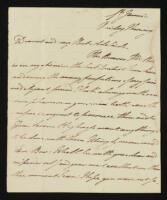

![Letter from David Ricardo to [William Fry]](/uploads/r/trinity-college-library/e/f/9/ef9add8637388c3fafd703224e298ee3389374af334bea8256deb0a90dd1fee0/004.SRMS.B19.2r.tmb.jpg)
![Letter from Richard Carlile to [Thomas Clio] Rickman](/uploads/r/trinity-college-library/1/f/8/1f81913a3980b50d55a84ee80090e57df65516987d5e77891efeb7e852b59fe8/002.SRMS.B23.1.front.tmb.jpg)




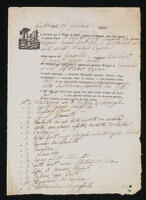


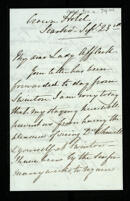


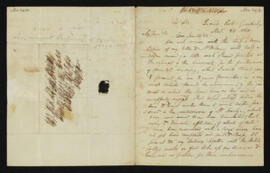




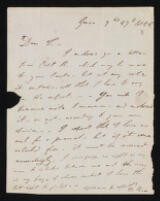



![Letter from David Ricardo to [Thomas] Hodgetts](/uploads/r/trinity-college-library/3/6/b/36b445528f87cd332ae67917f2664dd1a83e4f5a5f0eb0f5fdd2d4d1f6d62ae3/011.SRMS.B19.5r.tmb.jpg)




